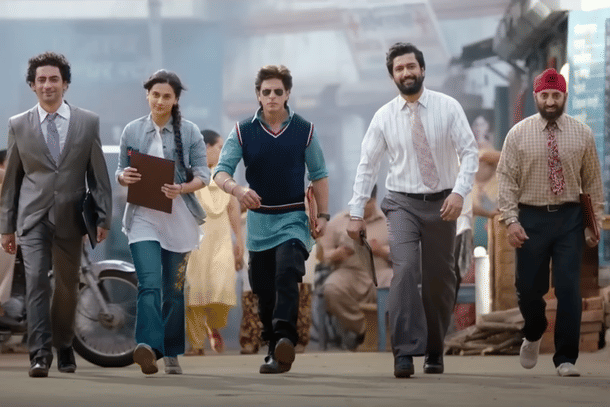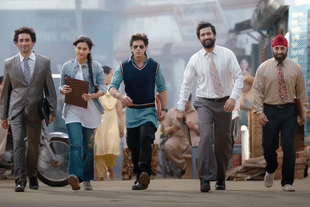Movies
'Dunki' Stumbles On The Hurdle That 'Nala Damayanthi' Cleared With Éclat 20 Years Ago
K Balakumar
Dec 22, 2023, 08:30 PM | Updated 08:30 PM IST
Save & read from anywhere!
Bookmark stories for easy access on any device or the Swarajya app.


First things first, I am a fan of Rajkumar Hirani's brand of humour and, save for the biographical film Sanju, I like his directorial works, not excluding 3 Idiots and PK. The sense of impish mirth in Hirani's films works for me.
I am also an admirer of Shah Rukh Khan's comic flair; he can sell even the most banal of jokes with rare charm.
So, at least for me, the Hirani-SRK pairing is one made in humour heaven. And Dunki, about a bunch of Punjabis — a community with a large heart, especially for fun and quips — had everything going for it.
In a tiring season where movies have all been about guns and gore, Dunki was expected to be the much-needed salve of sorts.
To be sure, Hirani and Khan try to keep it light. But they never manage to find the fizz and froth.
The story, its treatment, and characterisation don't click together, and eventually what we get is a couple of smart gags and some jokes that land but not many others.
The goofy grin that generally emerges after watching a Hirani film was missing.
(Major spoilers ahead)
The film didn't have the kind of characters you want to get behind. It even starts off in 3 Idiotsesque fashion, with a bunch of friends setting out in search of their principal pal with whom they have lost contact for years.
The similarity causes intrigue, and you prepare for a similar romp.
Dunki Isn’t 3 Idiots
But you quickly realise that Hardyal Singh Dhillon, or Hardy (SRK), Mannu (Taapsee Pannu), Buggu (Vikram Kochhar), and Balli (Anil Grover) are no Ranchoddas Shamaldas Chanchad, or Rancho (Aamir Khan), Farhan Qureshi (R Madhavan), and Raju Rastogi (Sharman Joshi).
Apart from the hero, you rooted for Farhan and Raju in 3 Idiots, even though they were losers. That was because of their redeeming skills and qualities. They were from middle-class families, and if you were from that background, you could relate.
But here, Mannu, Buggu, and Balli don't have character arcs that allow you to care for them. Their family members are used merely as props to harvest some cheap, jaded laughs.
To be sure, Mannu, Buggu and Balli are indigent, but the way their characters are written, you hardly feel for their plight.
The hero Hardy is, well, heroic. But again, he isn’t quite as enigmatic, nor does he have the waggish spirit of Rancho.
Hardy also sticks up for his friends through thick and thin, but he has no other aspect to his personality. Rancho, on the other hand, was a champion of science and easy tutoring methods.
And then, there is Sukhi (Vicky Kaushal), who, unable to get a visa to the United Kingdom (UK), burns himself up. Again, this arc takes us back to that Joy Lobo (Ali Fazal) character in 3 Idiots who also takes his own life.
In both films, suicide is what makes the flippant group look at life and the future more seriously. But Sukhi's death doesn't jolt the viewer as much as Lobo's did in the way it was presented.
Also, the obvious hole in the plot — Sukhi, who wants to stay in London just for a day and return, could have opted for the tourist visa rather than try to pass the IELTS exam — gapes at you sheepishly.
Anyway, once Hardy & Co decide to take the illegal route, the Dunki way as it were, to enter England, the film loses track completely.
The edge-of-the-seat thrills of sneaking through multiple hostile countries could not be harvested here because Hirani doesn't possess the nous to handle such aspects. He doesn't execute gritty action set pieces well.
So, the bunch of friends slithering through dark, porous borders are treated generically, and with that, the film loses all its steam and strength.
The reverse immigration from England back to India also fails to impress, even though there is a clever twist.
In the midst of it, the Khan character refuses to tell a lie (inconsequential in the context) against his home country. "I will not speak bad about my country to stay in another nation," he says with admirable pride.
This line could have been rousing, yet somehow it arrives sans any exhilaration. It feels flat, much like the rest of the film.
Lost To Flippancy
Dunki's larger point about visas for the "first world" countries and how the entire system is structured to keep the poor and needy out is lost. The film's overall tenor and central theme don't come together.
But it is not as if weighty ideas cannot be conveyed in a fun, spirited way. Twenty years ago, the Tamil film Nala Damayanthi, written and bankrolled by Kamal Haasan, handled the very same subject with joyful éclat.
That film was about a naive, good-hearted cook from Palakkad who finds himself afoul of immigration laws in Australia and still tries to stay there through deceit.
It was a lesson in marrying larky treatment with an important international issue. It is both about art and craft.
In Nala Damayanthi, the hero Ramji (Madhavan) is a skilled cook and brings money in an alien land to his employer with his ability. And when his visa is rejected on technicalities, you get a real insight into the problem.
But in Dunki, Mannu and his friends do not possess any real talent. They are simply presented as a nice set of people. Why would any country give visas to a bunch of people who you will have trouble hiring if you were running a shop?
In that sense, Dunki does a disservice to an important issue that deserves discussion. But it is difficult to be harsh on a film which at no point takes itself or its characters seriously.





